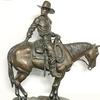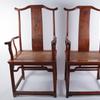SOTHEBY’S TO OFFER ONE OF THE MOST IMPORTANT DISCOVERIES OF AMERICAN FURNITURE IN HALF A CENTURY
- NEW YORK, New York
- /
- January 04, 2012
A Previously Unknown High Chest of Drawers By Legendary Cabinetmaker John Townsend Will Highlight the Important Americana Auction In January 2012.
Sotheby’s is pleased to announce that its New York auction of Important Americana on 20 & 21 January 2012 will feature a previously undocumented high chest of drawers by renowned cabinetmaker John Townsend, which represents one of the most important discoveries of American furniture to come to light in decades. Signed and dated in 1756 when Townsend was 23 years old, The Exceptional Lieutenant Colonel Oliver Arnold Shell-Carved and Figured Mahogany High Chest of Drawers with Open Talons stands as his earliest surviving high chest, as well as one of the two earliest known works by his hand (est. $2/3 million*).
The chest was originally owned by Lieutenant Colonel Oliver Arnold (1725-1789) and Mary Oliver Arnold (1725-1762) of East Greenwich, Rhode Island, who commissioned it on the occasion of their marriage in 1756. It has survived in their family for 255 years, having descended through six generations of female lines of the Arnold-Wightman-Wickes branches of their family to the current owner, Oliver Arnold’s great-greatgreat-great granddaughter. The work remains in remarkably untouched condition, and retains its original surface and all of its original parts.
“This sale represents a rare opportunity to purchase one of the most extraordinary and historically significant pieces of American furniture to ever come to auction,” commented Leslie Keno, Director of Sotheby’s American Furniture & Decorative Arts department in New York. “In my 33 years at Sotheby’s, I have never seen anything quite like this high chest. In addition to its masterful execution and extremely fine state of preservation, it carries a direct history of descent through successive generations of the same family. Before my colleague Erik Gronning and I discovered it hidden on the upper floor of an early house in New England, almost no one outside of the family had laid eyes on it. We are thrilled and honored to have the opportunity to offer this supreme masterwork at auction.”
John Townsend – Legendary Craftsman
In its beauty and exceptional workmanship, John Townsend’s remarkable body of work reveals a methodical and meticulous master craftsman who favored fully developed forms, precision of execution, and a preference for labor-intensive methods of construction. Born in Newport in 1733, John was the son of Christopher Townsend, a co-founder of the Quaker family dynasty of cabinetmakers. John apprenticed in his father’s shop on Easton’s Point, probably between about 1747 and 1755, and established his own business soon after completing his training. His accomplished working career spanned nearly 50 years, and his exceptional output was celebrated most recently with the Metropolitan Museum in New York’s exhibition John Townsend: Newport Cabinetmaker in 2005.
The Shell-Carved and Figured Mahogany High Chest of Drawers, which is inscribed on the interior drawer bottom Made By John Townsend Newport 1756, is one of only five surviving examples bearing Townsend’s signature in graphite. This piece represents his earliest version of the classic Newport high chest form, made as his masterwork soon after he completed his apprenticeship with his father. Consistent with Townsend’s shop practice, the high chest is impeccably proportioned and meticulously constructed, with carefully selected and highly figured book-matched mahogany drawer fronts and scroll board plaques, tigerstriped mahogany cornice cavetto moldings and drawer dividers, an exquisite tiger-striped mahogany shell, and realistically carved open talon ball-and-claw feet.
Townsend also made an extant mahogany dining table in 1756, which was sold at Sotheby’s in 1980 and is currently a promised gift to the Metropolitan Museum of Art on behalf of Philip Holzer. Only one other bonnet-top high chest of this type with Townsend’s signature and date is known: a high chest of drawers in the collection of Yale University, with a history in the Brixley family.
Hand Inscriptions
John Townsend’s pride in this high chest is clearly evident from the inscriptions he placed on the piece. He signed his name a second time on a drawer divider and additionally inscribed it with his maker’s mark – a large calligraphic “M” – no fewer than five times. No other piece by Townsend that is known to exist has as many maker’s marks or inscriptions. On the underside of one of the drawers, he wrote in graphite W. Richardson / J. Robinson / E. Wanton / J. Townsend / To Ride Out next Wednesday. William Richardson, Joseph Robinson, Edward Wanton and John Townsend were very close friends, related through marriage or business associates, or both. Wanton was the son of the Governor of the
Colony and William Richardson was the son of the Treasurer.
Demonstrating Townsend’s sense of humor, the inscription Woman Is By / Nature False & Inconstan(t) ... W...full W Richardson appears on the interior of the same drawer bottom as the men’s names. Townsend credits these words to William Richardson, suggesting the possibility that the two men, along with Edward Wanton and Joseph Robinson, were in the room at the time. The inscription
appears to be a playful commentary on marriage, revised from Joseph Addison’s quote from a play written in 1680 by Thomas Ordway entitled The Orphan, or The Unhappy Marriage. The play was attempted in Boston in 1750 and its appearance caused such uproar that a ban was placed on any further theatricals in the colony.
Direct Descent through an American Family to the Consignor
As previously stated, this chest was originally owned by Oliver and Mary Arnold of East Greenwich, Kent, Rhode Island, who commissioned it from John Townsend on the occasion of their marriage in 1756. It descended along six generations of female lines of the Arnold / Wightman / Wickes branches of their family to the current owner, Oliver Arnold’s great-great-great-great granddaughter.
Oliver Arnold served as Lieutenant with the rank of Lieutenant Colonel under the command of Captain
Benjamin Arnold of the Pawtuxet Rangers, a militia chartered by the Colony of Rhode Island and Providence Plantations on October 29, 1774. From the mid-19th century until 1976, the chest stood in the southeast bedroom of the family homestead known today as the Oliver A. Wickes House, included on the National Register of Historic Places.















_-Closing-the-Distance_100x100_c.jpg)








